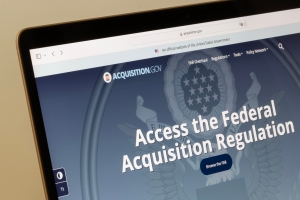 Essential Takeaways
Essential Takeaways
- Government contractor think tanks require specialized trade association insurance beyond basic FAR requirements.
- Professional liability coverage protects against research errors, policy recommendations, and publication risks.
- Contract-specific insurance obligations vary between prime contractors and subcontractors.
- Employee work location significantly impacts required coverage, especially for overseas operations.
- Independent insurance advisors help identify exposures and negotiate appropriate coverage limits.
Government contractor think tanks operate in an exclusive space where research expertise meets federal contracting obligations. These organizations provide policy analysis, strategic research, and advisory services to government agencies, creating distinct liability exposures that standard insurance policies often fail to address adequately. Trade association insurance designed for research-focused contractors must account for professional service risks alongside operational exposures.
The insurance requirements for think tanks differ substantially from those of traditional government contractors. While construction firms worry about physical injuries and equipment damage, research organizations must deal with liability arising from professional advice, data analysis errors, and published recommendations that agencies rely on for policy decisions. These organizations need coverage that protects both their operational activities and their intellectual work product.
Professional Liability Protection for Research Services
Think tanks deliver specialized knowledge services that carry significant responsibility. When an organization provides strategic recommendations or policy analysis to a federal agency, the potential consequences of errors extend far beyond the organization itself. Professional liability insurance is essential in such situations to protect against claims arising from research mistakes, flawed methodologies, or incorrect data interpretation.
Research organizations deal with exposure when agencies implement policies based on their recommendations. If a think tank’s analysis contains errors that lead to program failures or budget miscalculations, the organization could be subject to substantial legal claims. Coverage must extend to defense costs, settlements, and judgments that could otherwise deplete organizational resources and damage professional reputations.
Publication risks represent another significant exposure area. Think tanks regularly produce white papers, policy briefs, research reports, and congressional testimony that enter the public record. These publications can expose the authors to liability for defamation, copyright infringement, or factual errors that harm individuals or organizations mentioned in the research. Trade association insurance should include specific protection for these publication-related risks.
Meeting and Exceeding FAR Requirements
 Federal Acquisition Regulation standards establish minimum insurance requirements for government contractors, but these baseline protections rarely provide adequate coverage for think tank operations. The FAR limits were designed for general contracting activities and do not account for the professional service risks that research organizations deal with daily.
Federal Acquisition Regulation standards establish minimum insurance requirements for government contractors, but these baseline protections rarely provide adequate coverage for think tank operations. The FAR limits were designed for general contracting activities and do not account for the professional service risks that research organizations deal with daily.
Think tanks that meet only the minimum requirements leave themselves vulnerable to coverage gaps. The low limits specified in FAR regulations may cover basic operational risks but fall short when addressing professional liability claims that can easily exceed several million dollars. Organizations should work with insurance advisors to determine appropriate coverage limits based on their specific research activities, contract values, and potential exposure scenarios.
Prime contractors typically have fewer contractual insurance requirements from the government than subcontractors do. However, when think tanks serve as subcontractors to larger firms, they often encounter more demanding insurance obligations. Prime contractors frequently transfer risk through contract language that requires subcontractors to maintain higher limits and additional coverage types. Reviewing these requirements before contract execution is essential to avoid accepting obligations that become financially unfeasible.
Coverage for Overseas Research Operations
Many government contractor think tanks conduct research internationally or support agency operations outside the continental United States. These overseas activities introduce additional risks that require specialized insurance coverage. Standard domestic policies often exclude or limit coverage for international work, leaving organizations exposed when employees travel abroad.
Defense Base Act (DBA) coverage becomes mandatory when think tank employees work outside the United States on government contracts. This specialized workers’ compensation protection applies from the moment employees depart for overseas assignments. Organizations must secure DBA coverage before deploying staff to foreign locations, as standard workers’ compensation policies do not cover international work.
Business travel insurance provides essential protection beyond DBA coverage. Think tanks need policies that cover emergency medical treatment abroad, political evacuation, and security-related risks. Research staff working in unstable regions require access to evacuation services and medical care that meets American standards. Organizations should contract with providers that offer both insurance coverage and logistical support for emergencies.
Managing Contract-Specific Insurance Requirements
 Government contractor think tanks must carefully evaluate insurance requirements within each contract before acceptance. Some agreements include provisions that demand coverage types or limits that prove difficult or expensive to obtain. Organizations that find unreasonable insurance requirements after signing contracts may find themselves unable to secure compliant coverage at any price.
Government contractor think tanks must carefully evaluate insurance requirements within each contract before acceptance. Some agreements include provisions that demand coverage types or limits that prove difficult or expensive to obtain. Organizations that find unreasonable insurance requirements after signing contracts may find themselves unable to secure compliant coverage at any price.
Independent insurance advisors provide valuable guidance during contract review. These professionals can identify problematic insurance provisions, suggest alternative language that offers adequate protection for all parties, and help negotiate more reasonable requirements. Some contract provisions may request coverage that does not apply to the work being performed, and experienced advisors can help eliminate these irrelevant requirements.
CI Solutions Helps Government Contractor Think Tanks Secure Appropriate Coverage
Government contractor think tanks deal with distinct insurance challenges that require specialized knowledge and careful planning. From professional liability protection to overseas coverage requirements, from prime contractor obligations to subcontractor demands, these organizations need trade association insurance specifically designed for research-focused government contracting operations. The right coverage allows think tanks to focus on delivering quality research and policy analysis while maintaining confidence that their professional activities remain properly protected.
Contact us today or call us at 703.988.3665 to learn how our government contractor insurance specialists can design coverage that addresses your think tank’s specific research activities and contractual obligations.
